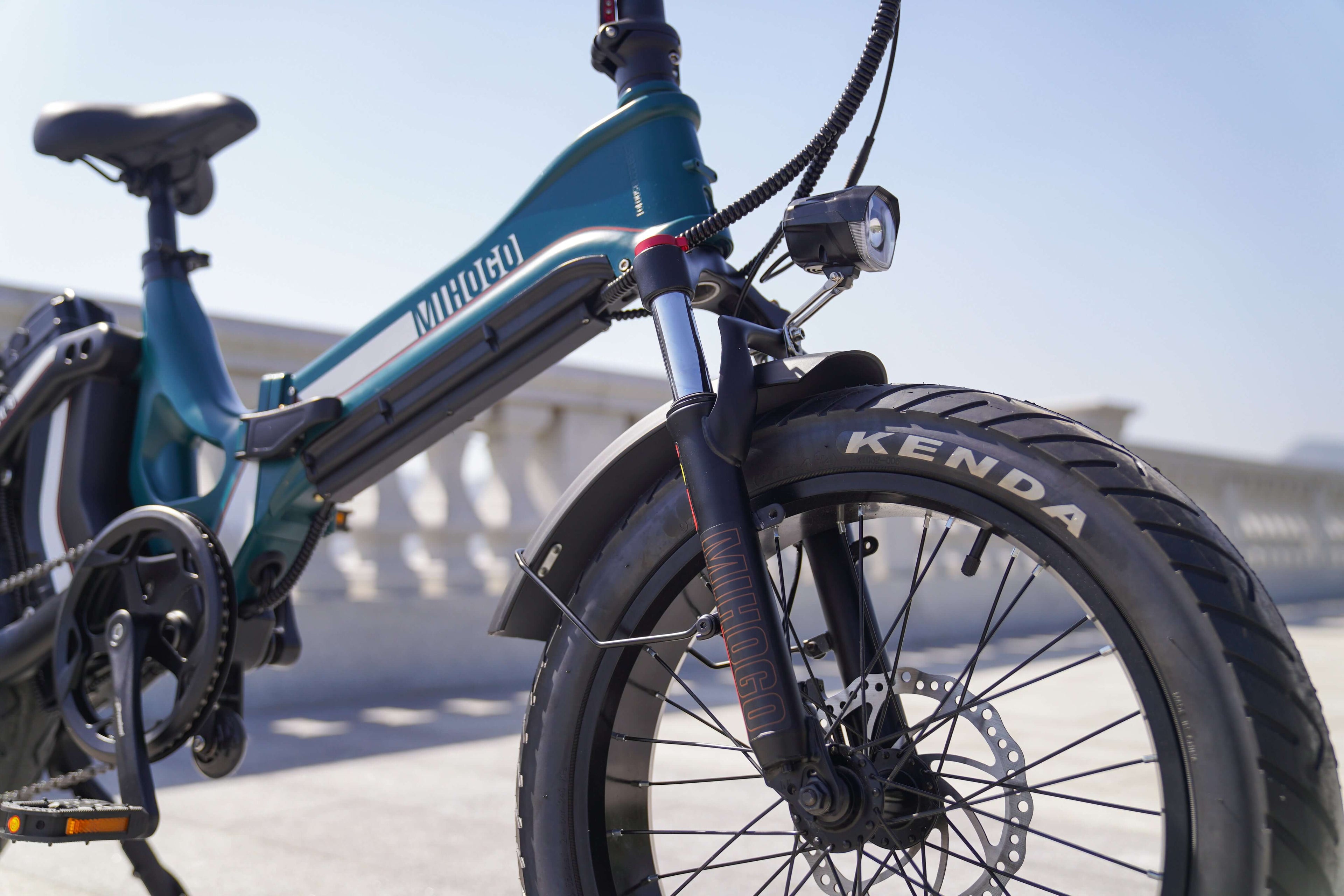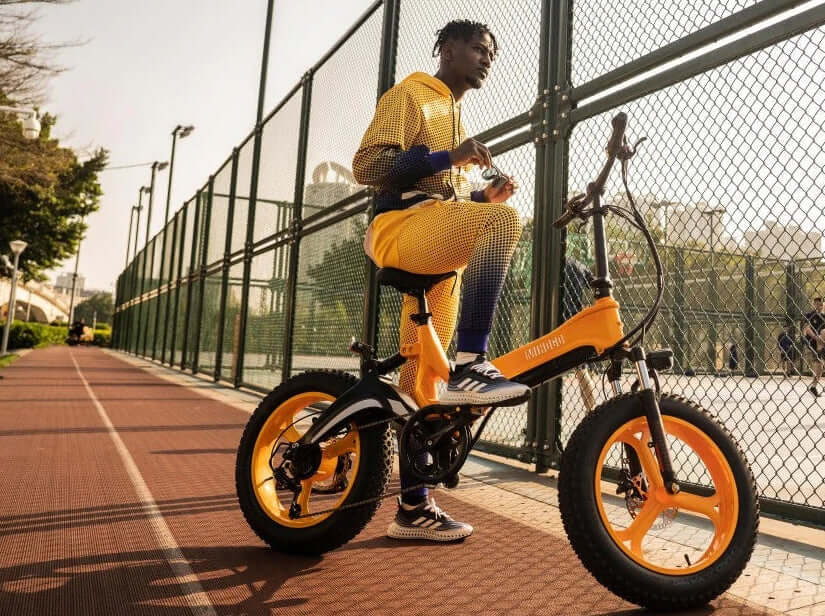Understanding European E-Bike Classifications and Speed Limits
Standard Pedelecs: The Foundation of Legal E-Biking
Standard pedelecs must have a maximum motor power of 250W with assistance cutting off at 25 km/h (15.5 mph). These bikes are treated as regular bicycles under European law, requiring no license, registration, or insurance.
Key Requirements for Legal Pedelecs:
- Motor power limited to 250W continuous rated power
- Pedal assistance only (no throttle operation)
- Speed assistance cuts off at 25 km/h
- Motor assistance must stop within 2 meters when pedaling ceases
Speed Pedelecs: High-Performance with Additional Requirements
Speed pedelecs can assist up to 45 km/h (28 mph) with motor power up to 4,000W, but face stricter regulations. These require licensing, insurance, and helmet use in most European countries.
How Mihogo Electric Bikes Comply with European Regulations
All Mihogo electric bikes are designed to meet strict European standards, ensuring legal compliance across the EU:
Mihogo Air Max: Premium Long-Range Compliance
The Mihogo Air Max features a sophisticated motor system that delivers optimal performance while maintaining legal compliance. With its dual battery system providing up to 128 miles range, this carbon fiber e-bike operates within the 25 km/h speed limit while offering five pedal assist modes for customized riding experiences.
Mihogo ONE Utility: Urban Commuting Excellence
The Mihogo ONE Utility E-bike combines 750W motor power with intelligent speed management, ensuring assistance cuts off precisely at the legal 25 km/h limit. Its dual battery configuration extends range to 167 miles while maintaining full regulatory compliance.
Mihogo NX: Adventure-Ready Legal Performance
The Mihogo NX fat tire e-bike delivers 750W motor power with pedal-assist functionality that strictly adheres to European speed regulations. Despite its off-road capabilities, the NX maintains legal compliance for both urban and recreational riding.
Mihogo RX 2.4: Compact Urban Compliance
The foldable Mihogo RX 2.4 features a 500W motor system designed for city commuting while respecting the 25 km/h speed limit. Its compact design makes it ideal for multi-modal transportation needs.
Mihogo Mini: Entry-Level Legal Riding
The Mihogo Mini offers 350W motor power with intelligent speed control, making it perfect for new e-bike riders seeking legal, reliable urban transportation.
Legal Riding Areas Across European Countries
Germany: Leading E-Bike Adoption
Germany requires riders to be at least 15 years old for pedelecs, with helmets mandatory for speed pedelecs but recommended for all e-bikes. Standard pedelecs can use bike lanes and designated cycling paths.
Netherlands: Cycling Infrastructure Excellence
The Netherlands allows pedelecs on all cycling infrastructure, including dedicated bike paths and cycle lanes. E-bikes must use mandatory cycle paths where available.
France: Urban Integration Focus
French regulations permit standard e-bikes on bicycle paths and lanes with specific velocity limitations on pedestrian routes. The country has invested heavily in e-bike infrastructure to support urban mobility.
Italy: Speed-Controlled Urban Access
Italy limits street-legal e-bike speeds to 6 km/h on pedestrian routes while allowing full speed on dedicated cycling infrastructure.
Belgium: Progressive Three-Tier System
Belgium recognizes three e-bike categories: 250W/25 km/h standard e-bikes, 1000W/25 km/h motorized bikes, and 4000W/45 km/h speed pedelecs.
Age Requirements and Safety Considerations
Most European countries require riders to be 14-15 years old for standard e-bikes, with some variations:
- Germany: 15 years minimum
- Switzerland: 16 years with category M license for certain models
- Belgium: 16 years for higher-powered models
- Denmark: 15 years for speed pedelecs with mandatory helmet use
Current Trends and Future Regulations
Potential Power Limit Increases
Germany is leading discussions to potentially increase e-bike power limits from 250W to 750W, with industry leaders like Bosch already developing 600W peak power motors. This could significantly impact European e-bike regulations in coming years.
Growing Market Demand
The European e-bike market is projected to grow at a 12.7% CAGR from 2025-2032, driven by cargo bike demand and urban delivery solutions.
Registration and Insurance Requirements
Standard Pedelecs
No registration, insurance, or licensing required for bikes meeting the 250W/25 km/h specifications across most European countries.
Higher-Powered Models
S-Pedelecs and bikes exceeding 250W require registration in Germany, Austria, and most other EU countries.
Practical Tips for Legal E-Bike Ownership
Before Purchasing
- Verify motor power specifications match your country's requirements
- Ensure speed limitation systems are properly calibrated
- Confirm pedal-assist-only operation (no throttle mode)
Daily Riding
- Use designated bike lanes where available
- Respect speed limits in pedestrian areas
- Wear helmets even when not legally required
- Carry identification and proof of purchase
Cross-Border Travel
Different European countries may have varying enforcement levels and specific local regulations. Understanding these differences is crucial for international travelers and anyone considering cross-border e-bike purchases.
Safety Features in Mihogo E-Bikes
All Mihogo models incorporate advanced safety technologies:
- Intelligent Speed Control: Automatic assistance cutoff at legal speed limits
- Advanced Braking Systems: Hydraulic disc brakes for reliable stopping power
- Lighting Systems: Integrated LED lighting for enhanced visibility
- Suspension Technology: Dual suspension systems for stable, controlled riding
Environmental Benefits and Urban Integration
E-bikes consume just 9g of CO2 per kilometer – 30 times less than conventional vehicles. Mihogo's electric bikes contribute to sustainable urban transportation while providing practical alternatives to car dependency.
Future Infrastructure Development
European cities continue expanding cycling infrastructure, with over 70 major European cities now operating e-bike sharing programs. This growing network supports increased e-bike adoption and legal riding opportunities.
Conclusion
European e-bike regulations prioritize safety while encouraging sustainable transportation adoption. Mihogo's comprehensive range of electric bikes ensures full compliance with current regulations while delivering exceptional performance and reliability. Whether commuting through busy city centers or exploring scenic countryside routes, Mihogo e-bikes provide legal, efficient, and enjoyable transportation solutions.
For more information about e-bike maintenance and optimization, explore our comprehensive guide to e-bike care. Stay updated with the latest industry developments through our regular blog posts covering emerging technologies and regulatory changes.
External Resources:
- European Union E-bike Regulations - Comprehensive overview of EU e-bike laws
- European Cyclist Federation - Latest cycling policy developments and infrastructure updates






